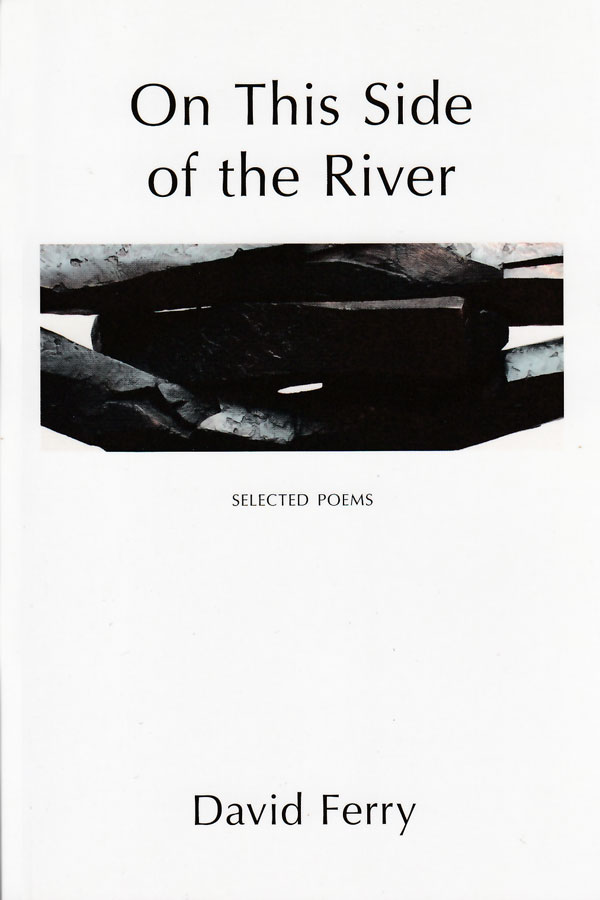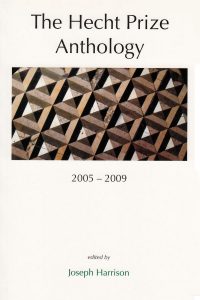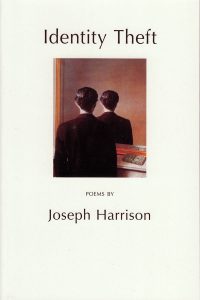On This Side of the River: Selected Poems
£12.99
David Ferry is one of the most distinguished poets writing in the USA today, as one of his most recent honours, the Poetry Foundation's $100,000 Ruth B. Lilly Prize ("presented annually to a living American poet whose lifetime accomplishments warrant extraordinary recognition"), amply attests. On This Side of the River is the first gathering of his work to be published in the UK, and offers a carefully organized representation of the work of this remarkable writer, both as original poet and as unrivalled translator.
On This Side of the River: Selected Poems
Reviews of On This Side of the River
Poetry Review, Summer 2013
"To read through this UK sampler of Ferry’s work – in which poems are freed from the contexts of their original volumes and made to converse anew in the light of subsequent work – is to re-experience Ferry’s oeuvre as a lifetime’s continuous circling of the same overwhelming questions to do with isolation and apart-ness: that ‘we’re all in this aprt’ as a recent found poem ingeniously re-discovers our human predicament. Readoing becomes an exercise in remembering and dismembering, as the elegies for Anne Ferry [the poet’s wife] change everything, back-lighting all of Ferry’s poems from his first collection On the Way to the Island (1960) to this moment in Bewilderment (2012): ‘I have been so dislanguaged by what happened, / I cannot speak the words that somewhere you / Maybe were speaking to others when you went.’ … ‘In Eden’, a three-liner of agonised questioning in the grips of love, language, knowledge and betrayal, is itself a lesson in reading as tending and attending. The deafening double silence between the lines … is key to its impact, calling to mind Randall Jarrell’s description of Robert Frost’s ‘Design’ as a poem that ‘makes Pascal’s "eternal silence of those infinite spaces" seem the hush between the movements of a cantata’ or Beckett’s apprehension of the ‘unfathomable chasms of silence’ in Beethoven’s Seventh Symphony." – Maria Johnston
Arts Fuse, 14 January 2013
"David Ferry has had two books published in fall 2012: Bewilderment: New Poems and Translations, winner of the National Book Award, and On This Side of the River: Selected Poems, his first British volume. He is lucky in his editors, and they in him … Ferry never publishes a frivolous poem. Because his work has always been mature, it is not necessary to use the unspoken apology that chronological arrangement can supply. While On This Side of the River is a Selected volume, it organizes the poems (including translations) into sections that share a feeling or subject or sound, as if it were a volume without reference to previous ones. Not quite a Complete Poems, at 248 pages it is thorough in including large or complete selections of all Ferry’s books – On the Way to the Island; the Chicago Press volumes, Strangers (1983), Dwelling Places (1993), Of No County I Know (1999, new and selected) and Bewilderment; Gilgamesh (1992); and his Farrar, Straus and Giroux translations, Horace’s Odes (1997) and Epistles (2001), Virgil’s Eclogues (1999) and Georgics (2005). Dates of first publication follow each poem in the table of contents. By referring to these, a reader can, but is not forced to, consider the poems under the aspect of time or see how Ferry’s volumes have all been notable for their coherence. Like other Waywiser volumes, the paperback is solid and nice in the hand. It is a generous introduction to a real poet, with an organization that makes good sense.""– Marcia Karp
To read the whole of this review, click on the link below:
http://artsfuse.org/75126/fuse-poetry-review-the-beautiful-precision-of-poet-david-ferry/
New Statesman, 23-29 November 2012, The Critics: Books of the Year
“David Ferry is a transcendent American poet who has not had his due over here, where, until now, only his eloquent translation of Gilgamesh has been published. At last, one of the UK’s best publishers of poetry does right by him, with On This Side of the River: Selected Poems, a handsome representation of his life’s work at its best, up to this very year. Ferry’s cadences are firm and touchingly tentative, his phrasing individually turned, his poignancies unsentimental. The true voice, or rather the true voices, of feeling, as clear as a bell, from a great poet, now of a great age. Alive with stoicism’s wit, ‘Turning Eighty-Eight, a Birthday Poem’, a recent one-line poem, is no flat line: ‘It is a breath-taking, near-death, experience.’" – Christopher Ricks
Praise for David Ferry
“Now that most of a lifetime’s poems and translations have been gathered together into one book, many more readers must now realize what a masterly poet we have had among us. There can be few contemporary poets who would not desire this man’s art and scope. David Ferry, like a bird in one of his poems, is ‘attentive to the minutiae of [his] task’, and whatever the task, whatever the theme, he has made poem after poem of surpassing honesty, clarity, and beauty.” – Robert Mezey
“David Ferry is a marvel and a treasure who … keeps getting better and better.” – Robert Pinsky
“Ferry has sounded the deeps of modern and classical poetry and his own poetry helps us feel our way to the very edge of what George Eliot once called the other side of silence.” – Richard Poirier
“Ferry’s genius is – like Wordsworth’s – explorative and restorative.” – Christopher Ricks
"David Ferry is a unique talent, at the same time detached and passionate. I most admire his ability to express so nobly and troublingly both the inside and the oputside of the disordered psyche, as in ‘The Guest Ellen at the Supper for Street People.’" – Thom Gunn
“There is no better poet on the planet than David Ferry. For the music that only poetry can offer, for the acute sensation of time passing, for the feeling of life as an effect of absent causes, for the haunted house that is both the present moment and the language by which the present is expressed.” – Alan Shapiro
“Define ‘great’ however you like, David Ferry is a great poet.” – Tom Sleigh
“David Ferry shows us that his magnificent translations are as intimately personal as his own poems are heartbreakingly classical. In his wisdom, his self-awareness, his humor at the ways of the world, he has become our Horace. And even better, in the process he has also become more deeply and indispensably himself.” – Lloyd Schwartz
“[A] master whose major theme has always been human loneliness.” – Richard Wilbur
“In a time when most poetry relies on intense surface energy, Ferry’s effects are muted and subterranean – but then, in their cumulative effect, seismic. For fifty years he has practiced poetry as if it truly matters to our lives and to our souls – and now his poems have that rare power to wake us up to both.” – Christian Wiman
“The best translator of modern America.” – Peter Campion
Down by the River
The page is green. Like water words are drifting
Across the notebook page on a day in June
Of irresistible good weather. Everything’s easy.
On this side of the river, on a bench near the water,
A young man is peaceably stroking the arm of a girl.
He is dreaming of eating a peach. Somebody’s rowing,
Somebody’s running, over the bridge that goes over
The highway beyond the river. The river is blue,
The river is moving along, taking it easy.
A breeze has come up, and somewhere a dog is barking,
Acknowledging the stirring of the breeze.
Nobody knows whose dog. The river is moving,
The boats are moving with it or else against it.
People beside the river are watching the boats.
Along the pathway on this side of the river
Somebody’s running, looking good in the sunshine,
Everything going along with everything else,
Moving along in participial rhythm,
Flowing, enjoying, taking its own sweet time.
On the other side of the river somebody else,
A man or a woman, is painting the scene I’m part of.
A brilliantly clear diminutive figure works
At a tiny easel, and as a result my soul
Lives on forever in somebody’s heavenly picture.
The Waywiser Press
Measure 100
There is a passage in the Mozart K.
511 Rondo in A Minor,
Measures 98 through 101,
And focused on measure 100, where there are
At least four different melodies, or fragments
Of melodies, together and apart,
Resolving themselves, or unresolving themselves
With: enigmatic sweetness, or melancholy;
Distant memories of victories,
Personal, royal, or mythic over demons;
Sophisticated talking about ideas;
Moments of social or sexual concord; or
Of parting though with mutual regret;
Differences and likenesses of natures;
It was what you said last night, whoever you are,
That told me what your nature is, and didn’t;
It was the way you said the things that you said,
Grammar and syntax, agents of our fate;
Allusions to disappointments; as also
To an unexpected gift somebody gave
To someone there in the room behind the music;
Someone else working out a problem
At a table under the glowing light of a lamp;
Or the moment when the disease has finally
Proceeded to its foregone working through,
Leaving behind it nothing but the question
Of whether there’s a heaven to sing about.
The clarity and poise of the arrangement,
The confidence in the very writing of it
Fosters the erroneous impression that
There’s all the truth there is, in the little nexus,
Encapsulated here in narratives
Diminutive in form, perfectly told,
As far as they are willing to be told.
According to the dictionary, “resolve”
Derives from “solve” and “solve” derives from the Latin
“Solvere” that means “untie,” and “re-“
Is an intensifier, meaning “again,”
And so, again, again, and again, what’s tied
Must be untied again, and again, and again;
Or else it’s like what happens inside a lock,
The cylinders moving back and forth as the lock
Is locked, unlocked, and locked, over and over.
The Waywiser Press





